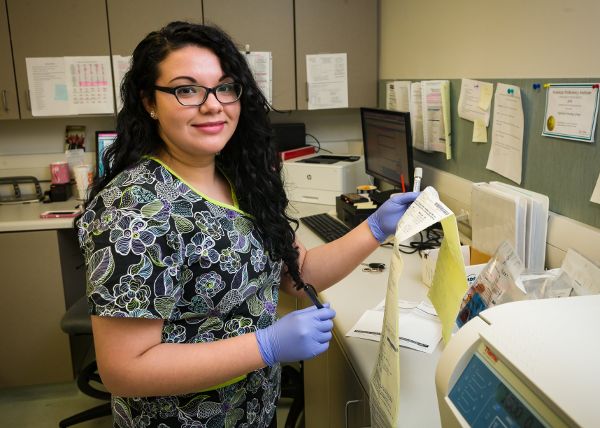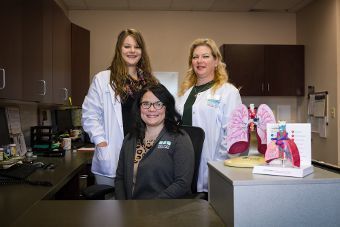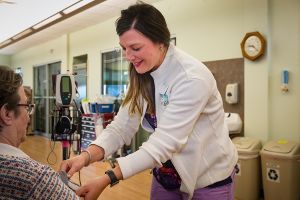Colorectal Cancer is the 2nd deadliest cancer in the USA, and it is highly preventable. Being screened at the right intervals saves lives. A colonoscopy is the most common way to do screening, but there are other methods. Consult your physician as to which one is right for you.
Colorectal Cancer is no longer an “old person’s disease”. 1 in 5 people diagnosed today, are younger than 55 years of age.
The new age to begin screening is 45 years old. Most insurance companies are now recognizing this new standard of care.
If you have a family history, you should begin screening at 35 years of age or 10 years before the earlier onset of anyone in your family.
People of color are about 20% more likely to get Colorectal Cancer and about 40% more likely to die from it.
For people at average risk
- A personal history of colorectal cancer or certain types of polyps
- A family history of colorectal cancer
- A personal history of inflammatory bowel disease (ulcerative colitis or Crohn’s disease)
- A confirmed or suspected hereditary colorectal cancer syndrome, such as familial adenomatous polyposis (FAP) or Lynch syndrome (hereditary non-polyposis colon cancer or HNPCC)
- A personal history of getting radiation to the abdomen (belly) or pelvic area to treat a prior cancer
Test options for colorectal cancer screening
- Highly sensitive fecal immunochemical test (FIT) every year
- Highly sensitive guaiac-based fecal occult blood test (gFOBT) every year
- Multi-targeted stool DNA test with fecal immunochemical testing (MT-sDNA or sDNA-FIT or FIT-DNA)) every 3 years
- Colonoscopy every 10 years
- CT colonography (virtual colonoscopy) every 5 years
- Sigmoidoscopy every 5 years
Description
Colon or rectal cancer begins when cells in the colon or the rectum start to grow uncontrollably. A tumor can form when more cancer cells develop, and it can spread to other areas of the body. As it grows and spreads, the cancer becomes more advanced. Colon and rectal cancers share many features in common, and are sometimes grouped under the general label “colorectal cancer.”
The colon is the part of the digestive system which absorbs water and salt from food matter that has passed through the stomach and small intestine. The rectum is the last part of the digestive system, which stores waste matter until it is passed in a bowel movement. Colorectal cancers commonly start as growths on the inner lining of the colon or rectum, called polyps; not all polyps are likely to develop into cancers, but it is important to discuss abnormalities with your doctor.
Types of colorectal cancer include:
- Adenocarcinomas (About 96% of colorectal cancers are of this type)
- Carcinoid tumors
- Gastrointestinal stromal tumors
- Lymphomas
- Sarcomas
Symptoms
Early colorectal cancers may not cause symptoms, but symptoms may include:
- Persistent change in bowel habits (diarrhea, constipation, or narrowing of stool, lasting more than a few days)
- Feeling of bowel movement urgency not relieved by having a bowel movement
- Rectal bleeding (bright red blood)
- Bloody stools
- Cramping or abdominal pain
- Weakness or fatigue
- Unintentional weight loss
- Anemia (low red blood cell count) caused by blood loss into the digestive tract
It is important to note that the symptoms above can be caused by a number of other non-cancerous causes, but it is important to be checked by a medical professional to improve the chances of effective treatment.
Risk Factors
The links between lifestyle factors (factors that can be modified to reduce risk) and the risk of colorectal cancers are among the strongest for any type of cancer. Modifiable risk factors which increase your risk of colorectal cancer include:
- Overweight or obesity
- Physical inactivity
- Diets high in red meat and processed meats
- Smoking
- Heavy alcohol use
Certain conditions can increase the risk of developing colorectal cancer (for more detailed information about these conditions and gene mutations, visit the American Cancer Society website):
- Previous colorectal cancer or polyps
- Inflammatory bowel disease
- Family history of colorectal cancer or adenomatous polyps
- Lynch syndrome or hereditary non-polyposis colorectal cancer (HNPCC)
- Familial adenomatous polyposis (FAP)
- Peutz-Jeghers syndrome (PJS)
- MYH-associated polyposis (MAH)
- Type 2 diabetes
Prevention
Many cases of colorectal cancer can be prevented by detecting and removing pre-cancerous polyps. If you are over the age of 45, it’s important to discuss screening options with your doctor.
Other recommendations to prevent or lower your risk of colorectal cancers include:
- Stay at a healthy weight, and particularly avoid weight gain in the midsection.
- Engage in regular physical activity; moderate activity (brisk walking) lowers risk, and more vigorous activity may reduce risk even further.
- Limit red meats and processed meats, and eat plenty of vegetables and fruits. Ongoing research suggests that diets higher in fiber may be beneficial.
- Avoid excessive alcohol consumption.
- Refrain from or stop smoking.
Diagnosis
While some colorectal cancers are found after symptoms appear, many people are diagnosed with no symptoms at all. For this reason, regular screenings are important for early detection, and regular stool-based or visual tests (including colonoscopy) are recommended for those at average risk over the age of 45. Find more information about screening recommendations from the American Cancer Society website.
If there is a suspicion of colorectal cancer, a detailed medical history and physical exam will be performed. Your doctor will ask questions about your risk factors and family history. The physical exam will include an examination of your abdomen and may include a digital rectal exam.
Diagnostic colonoscopy or proctoscopy is often used to confirm a diagnosis of colorectal cancer, and may be combined with biopsy and blood tests. Imaging tests including CT, Ultrasound, MRI, PET, and X-ray (including angiography) may be used throughout diagnosis and treatment.
Other tests may be used in addition to the diagnostic tools discussed above.
Treatment
The treatment plan will depend on the stage of the cancer, as well as other factors. Our doctors will work closely with you and your family determine the best treatment plan for you. Options for treatment could include:
- Surgery
- Radiation therapy
- Chemotherapy
- Targeted therapy
- Immunotherapy
Your doctor may decide more than one of these treatment options will be in your best interest. Surgery and radiation therapies are common treatment options for early-stage cancers.







